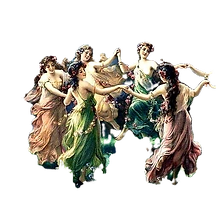top of page

Pan Flute
Pan
Syringa
Pan was the god of nature, forests and pastures. According to legend, he was born with goat legs, and the mother, looking at the baby, fled in horror.
But his father, Hermes, rejoiced at the birth of his son, he took him in
his arms and carried him to the bright Olympus to the gods.
All the gods rejoiced loudly at the birth of Pan and laughed as they looked at him.
God Pan did not stay with the gods on Olympus. He went into the shady forests, into the mountains. There he grazes herds, playing the sonorous flute.
As soon as the nymphs hear the wonderful sounds of Pan's flute, they rush to him in droves, surround him, and soon a cheerful round dance moves along the green secluded valley, to the sounds of Pan's music. Pan himself likes to take part in the dances of the nymphs.
For some time now, everyone began to notice that the always cheerful Pan became sad, he began to avoid noisy companies, and now the sad sounds of his flute were heard more and more often from the forest.
Pan fell in love with the beautiful Syringa and did not know how to tell her about it.
The beautiful nymph didn't love anyone and didn't even want to look at anyone.
The young nymph was in a short tunic, with a quiver over her shoulders and with a bow in her hands, she ran through the forest after shy deer, chased deer and hares, and she did not care about Pan in love. Once Pan met the beautiful Syringa in the forest and wanted to talk to her. But she, as soon as she looked at the goat-legged satyr, in fear rushed to run from him as fast as she could. Pan tried to catch up with the nymph. He asked her to stop, at least to talk to him. But with his appearance, Pan so frightened the young nymph that she was even afraid to look at him.
But there was a river in her way. Syringa stretched her hands forward and began to beg the river god to save her. The forest god heeded the prayer of the young nymph and turned her into a reed. Pan had already caught up with Syringa and wanted to hug her, but his hands touched only a flexible reed.
The sad Pan stood for a long time on the bank of the river and listened to the quiet rustle. The slender reed was telling him something, but Pan did not understand what it was. The unfortunate Pan cut off several reeds and made a mellifluous flute out of them. In memory of his beloved, he named the flute a syringa. And often now Pan went alone into the dense thicket of the forest and played gentle sad melodies on his siring pipe.
messenger of the gods, patron of travelers

_edited.png)
Olympus - the mountain of the gods:
home of the gods in Greek mythology

Nymphs-
spirits of nature: rivers, seas, springs, lakes.

The Lonely Shepherd
André Rieu & Gheorghe Zamfir performing The Lonely Shepherd



Answer the questions:
1. Who is Pan?
2. Tell me what Pan looked like?
3. What did Pan invent?
4. What did he make it from?
5. What does this musical instrument look like?
6. What group of symphony orchestra instruments does it belong to?
7. Who was Pan's father?
8. Where did the father take little Pan after his birth?
9. Who are the nymphs?
10.Who is Syringa?
11. What has Syringa become and why?
12. Many languages have adapted Greek words. We know the words "music" and the "museum" also came to us from the Greek language in the same way as the word "panic".
How do you explain the appearance in our language of words such as "panic" and
"panic fear" ?
13. After watching the video say:
a) What instrument is soloing?
b) There are statues on the roof of the stage. Who do you think these statues represent?
c) What do you think, who can be in the very center of the figures of the statues?

bottom of page